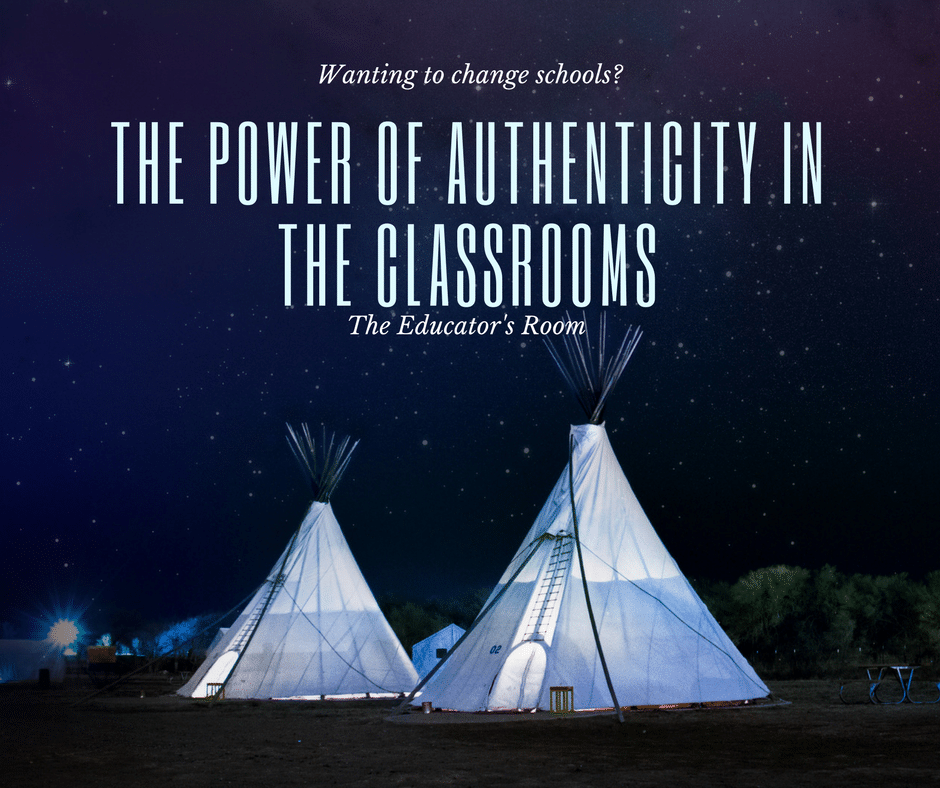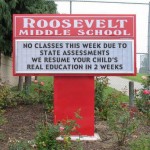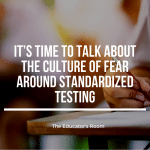Guest Post by: Maria Kruzdlo
“No one ever changed the world by choosing the best out of five possible answers.” While the author of this quote is unknown, the weight of the statement can not go unnoticed for it drives home the value of learning in the first place. In our ever changing world, it the responsibility of educators to provide students with authentic learning opportunities that furnish them with the tools required to be independent thinkers. On May 3, 2017, Kylene Beers, author of Notice and Note and Disrupting Thinking tweeted, “Not everything that matters can be measured on a multiple choice test.”
Life is not multiple choice and while students may need to know how to answer such a query- it is problem solving and collaborative inquiry for a genuine purpose that gets them there. Test scores and data requirements often force teachers and administrators to get caught up in the minutia and lose sight of the bigger picture as educators which is to create critical thinkers who can change the world.
Authenticity in the education system is an area ripe for exploration and enhancement as it is what will actively engage all learners and make them want to rise to the task – because it has a purpose. The good news is that students have the desire to embrace authenticity. The bad news is that many teachers can not or will not. The better news is that with training and support, teachers can learn how to create authentic opportunities for all types of learners, including themselves. According to a January 2017 Education Week article, “17 Critical Issues Facing Education in 2017,” author Peter DeWitt suggests that a shift from compliant engagement to authentic engagement is essential to improving outcomes for students. “In order to get students to a level where they are assessment capable learners… we need to involve students in more authentic learning experiences.” Compliant learning will take a backseat to more authentic experiences when students have a voice in their own learning.”
[bctt tweet=”Compliant learning will take a backseat to more authentic experiences when students have a voice in their own learning.” ” username=””]
The challenge of this shift is providing schools with the infrastructure required to build curricula that overcome complacency. The need for authenticity is exactly the same element that makes it a challenge to do consistently and well. High stakes testing and data requirements bog down teachers and administrators. In many districts, the pressure to have high test scores makes school leaders opt for reliance on data heavy assessments instead of putting the energy into creating opportunities that will foster a love for learning and communication. While on the surface it may appear that replacing creative writing with test prep essay practice or replacing the exploration and problem solving of a student-centered issue with skill and drill math problems will boost test scores, it usually does the opposite; deflating a student’s desire and making school drudgery as opposed to purposeful, meaningful exploration. The structure of school with its “right” and “wrong” answers and report card grades inhibit a child’s innate desire to discover. The requirement to provide those marks and scores inhibits the teacher from seeking out opportunities to take a risk and build real learning beyond the pages of a textbook. Learning is a process, not an end product. All too often the traditional school system forces the focus to be on the product. It is time for a shift. That shift requires all stakeholders to be on board; it requires a willingness to enter the unknown, and a desire to fail for it is only then that one truly learns. We must instill this thinking in our students, our colleagues, our numerous community stakeholders.
[bctt tweet=”Learning is a process, not an end product.” username=””]
“It is a miracle that curiosity survives formal education.” Albert Einstein’s edgy words are ones that unfortunately hold true in many school systems. Authenticity is the way to break out of the cycle of mediocrity. Through genuine discourse and purposeful participation student voice and engagement rises to new heights. I’ve witnessed it in my 4th grade classroom time and again. Just recently, I setup my students to watch the live webcast of Crayola Crayon’s dandelion color retirement. It wouldn’t work on our classroom computer so I pulled it up on my phone and 24 eager children huddled around the 3×5 inch screen to watch the live announcement. Hushed whispers, mindful of their peers, traveled discussing this big news. Upon completion of the announcement conversation erupted, crayon packs were whisked out and creativity exploded. Unprompted, children posted on the best color, potential replacements, favorite combinations. By the end of the morning, a class letter sharing thoughts on the news and ideas for new colors was written, revised, published and ready to be mailed, along with creative, visual and written descriptions of viable replacements. Students eagerly worked, never a thought not to put in their best effort. This was real, it was important, and they had a voice. Authentic learning. Did I follow my lesson plans? No. Did the children learn the value of communicating their thoughts, collaborating with peers, expressing ideas in a concise, coherent fashion, using math to figure out how long it has been since a crayon was retired, learning geography figuring out where the Crayola Factory is located? Yes, all of the above. Now that is a multiple choice question worth its answer in gold. Every child was completely engaged because it was authentic, meaningful, relevant, and in real time. We
Authentic learning.
Did I follow my lesson plans? No. Did the children learn the value of communicating their thoughts, collaborating with peers, expressing ideas in a concise, coherent fashion, using math to figure out how long it has been since a crayon was retired, learning geography figuring out where the Crayola Factory is located? Yes, all of the above. Now that is a multiple choice question worth its answer in gold. Every child was completely engaged because it was authentic, meaningful, relevant, and in real time. We mailed our ideas to Crayola and within two weeks, upon return from Spring Break, we had a response from the company thanking them for their ideas and sharing new crayons and activities. This authentic learning experience enabled students to practice numerous skills with enthusiasm and excitement. Does it provide measurable data? Yes- in a non-traditional way.
The most dangerous phrase in any language is, “We’ve always done it that way.” I am reminded of this as I read Disrupting Thinking by Kylene Beers and Bob Probst. Two critical questions are posed: “What changes do we need to make in our nation’s schools? What assumptions make those changes hard?” Assumptions are so many tightly held by teachers. Change begins with acknowledgement of those beliefs and analysis of their relevance. Schools need to encourage more authentic learning opportunities, teachers need to be trained on how to incorporate them and get the data required. Using Open Education Resources (OERs) is one way to build authenticity. OERs provide teachers will a multitude of timely, engaging, vetted materials. Another is social media. These avenues provide an abundance of resources, a collaborative learning environment for educators, at no or low cost to districts. It’s a win, win. Classroom teachers must be present at the table to build a fluid infrastructure to help make this the norm instead of the exception.
As the push for more data and higher test scores continues, educational leaders have a responsibility to our current and future students to keep them curious, conscious, creative thinkers who will change the world.







Great post! I really enjoyed your outlook on this topic!
Excellent article – Authentic learners require authentic teachers.